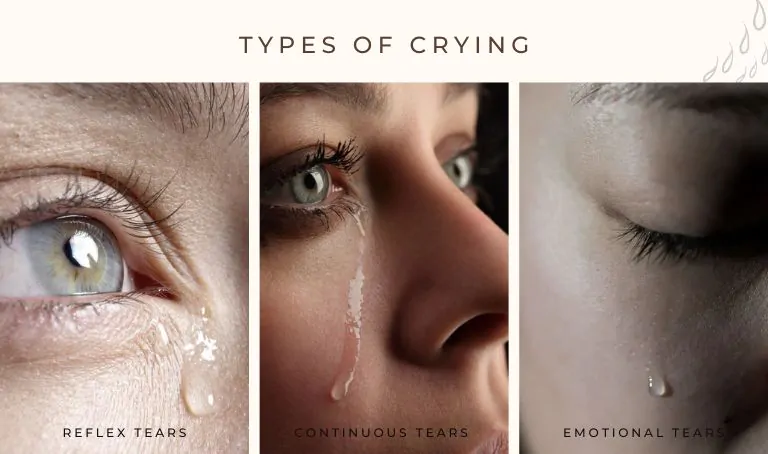It’s a plain fact that society views men and women crying differently. Women are seen as emotional creatures; their tears are not only accepted but also expected in many cases. On the other hand, men are taught to never cry and to never show their tears because they are signs of weakness. A man who cries easily is perceived as weak and even effeminate in certain cases. Needless to say, both perceptions are flawed. However, in order to correct them, we must, first, understand where they stem from. Second, exactly how does a man crying vs woman crying different? Third, are these perceptions healthy or unhealthy? And lastly, what can we do to change them?
Types of Crying
To start the discussion, let’s first establish that all tears are not the same. In fact, there are three types of tears.
- Reflex Tears – protect our eyes by removing debris, smoke, dust, and any other foreign object.
- Continuous Tears – keep our eyes lubricated & provide protection against viruses.
- Emotional Tears – that our body produces when we are overwhelmed and overcome by emotions, either positive or negative.
It’s the third kind of tears that are the focus of our discussion. Emotional tears are different from the first two. Where the former is 98% water, the latter contains more proteins and a hormone called prolactin which is produced by the pituitary gland & associated with emotions.

Why Do We Cry?
We all instinctively understand the answer to this question. We cry because it makes us feel better. Crying on bad mental health days is cathartic. This is backed by science. Crying releases oxytocin and endorphins. The former is a feel-good hormone that improves mood, and the latter reduces pain. Therefore, crying can reduce stress, anxiety, pain as well as fear, and nervousness.
Contrarily, holding back tears is unhealthy for our bodies. According to multiple studies, suppressing tears weakens the immune system, causes cardiovascular diseases, and hypertension, and increases the risk of stress, anxiety, and depression.
It is also a sign of helplessness, a way to communicate your feelings to others. Infants cry because they are helpless and rely on tears and sobbing to communicate their needs.
Women Cry Easier Than Men – Fact or Fiction?
According to the works of Adrianus Vingerhoets – a clinal psychologist from Tilburg University who specializes in human tears and crying, women cry more than men. To be exact, women cry 30 to 64 times on average in a year as compared to men who only cry 6 to 17 times per year. Moreover, women tend to cry longer in one sitting than men. Well, that’s one stereotype affirmed, but why do women cry more than men?
How Does a Man Crying Vs Woman Crying Different?
The answer is multi-dimensional. It has roots in biological, emotional, and societal factors, which are discussed here.
Distinctions in Emotional Responses Between a Man Crying & a Woman Crying
Women are more emotional than men. They are more sensitive and experience a higher neural activity when confronted with emotional situations than men. Sympathy crying is also more common in women and children. This tells us that women are more emotionally mature as compared to their male counterparts. They can express their emotions better and consequently process them better.
Men and women also differ in how they respond to crying or view tears generally. A clinal trial found that women are more likely to help people crying irrespective of gender. Contrarily, men were more likely to only help women cry as compared to men crying. Researchers concluded that for women, crying communicates helplessness as well as a need for connectedness. For men, though, tears only communicate a sense of helplessness.
Whenever a woman cries or sees someone cry, her instinct is to seek comfort and provide comfort, respectively. Comparatively, men approach crying as a problem that needs a solution. That’s why often a man’s instinct is to offer solutions whenever they encounter a person crying.
Physiological or Biological Differences Between Men & Women Crying
- Shallow Tear Ducts in women
Male and female bodies are built differently. According to research, physicians measured the length & depth of tear ducts in both male and female skulls. The findings concluded that women have shallower and shorter tear ducts that are quick to fill up and spill over. On the contrary, men have deeper and larger tear ducts that don’t spill over easily. This could be one reason why women cry more than men.
- High Testosterone in men
Furthermore, hormonal differences also play a part in this. Vingerhoets argues that testosterone – the primary hormone in men, inhibits crying. He presents the example of male prostate cancer patients as evidence. These patients experience a dip in their testosterone levels and tend to become more emotional and cry more frequently. Similarly, women experience a rise in testosterone levels during the ovulation phase and report feeling good, their confidence growing, and staying in an overall positive mood. When testosterone levels drop before their period, they become overly emotional and cry often. We can see a correlation between testosterone levels and cry from these examples.
- High Levels of Prolactin in Female Tears
An analysis of male and female tears concluded that female tears contain 60% more prolactin than male tears. This distinction was only present in adult men and women. Before puberty, the chemical makeup of both male and female tears is the same. We can deduce from this that there are certain biological differences that cause men and women to cry differently.
Societal Factors & Gender Stereotypes – Why Can’t Men Cry?
“Boys don’t cry.” Men are conditioned to inhibit emotional expressions from early on. And crying especially is seen as a big sign of weakness in men. Since society frowns upon men crying, they grow up detached from their emotions. Many lack the ability to process and express their emotions in a healthy manner. They lack the ability to be vulnerable. Instead, their repressed emotions come out in bursts of anger and violence, leading to toxic masculinity and toxic communication. Since women process their emotions by crying out, anger and violence are less common to them.
It all stems from gender stereotypes. Society prizes stoicism in men. Even aggression and violence are accepted by them. It is interesting to note that if men cry while still being aligned with masculine stereotypes, it is more easily accepted. For instance, a study explores the prevalence of men crying in competitive sports – a traditionally masculine activity. According to this, it is not only accepted but seen as a sign of emotional depth rather than weakness when sportsmen or politicians cry.
Society gives more room to women to express their emotions and view their tears positively, as opposed to men unless they stick to traditionally masculine stereotypes.
To support this, a study found that in rich countries with more affluent and individualistic societies that allow more freedom of expression, people specifically men cry more often than people in poor & backward countries.
Strategies to Regulate Emotional Crying
For Men:
- Do not suppress your tears. Instead, create a secluded & private space for yourself to cry.
- Actively process your emotions. Name them; accept them and allow yourself to feel them fully.
- Practice breathing exercises and meditation.
- Men need to find healthier ways to express emotions. If crying isn’t an option, find alternative masculine ways to process emotions such as exercising, going to the gym, playing sports, etc.
- Consult a professional therapist who won’t judge you in any way.
For Women:
- Practice mindfulness.
- Journal your thoughts and emotions to let them out instead of crying.
- Go for a walk to do another activity to distract yourself when crying isn’t appropriate.
- Get a good sleep and wake up feeling better.
Key Takeaways
Men and women are inherently different creatures. They process and express emotions differently. Although men cry less, it doesn’t mean they are emotionless creatures. Similarly, even though women cry more, it doesn’t make them any less rational or logical. We need to understand that we’re all human beings, capable of a wide range of emotions. We need to undo cultural conditionings and embrace our emotions for a healthier, happier life.


